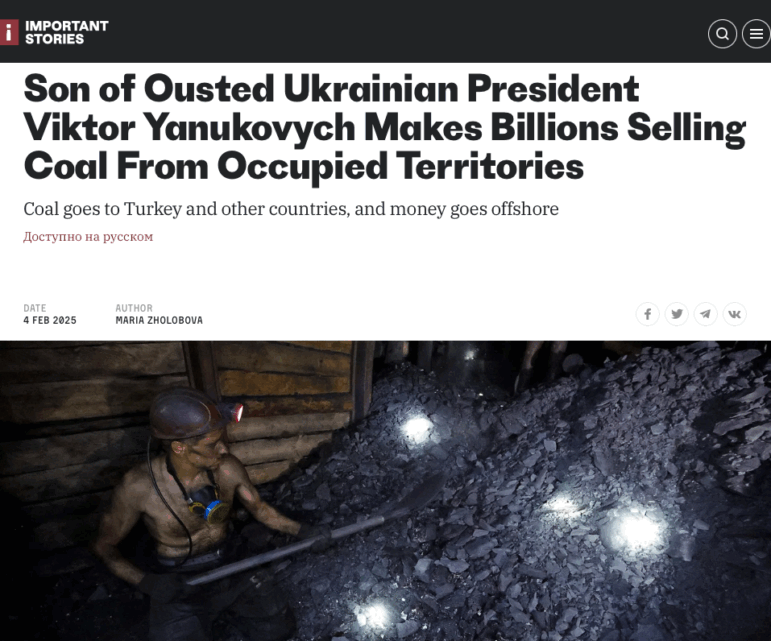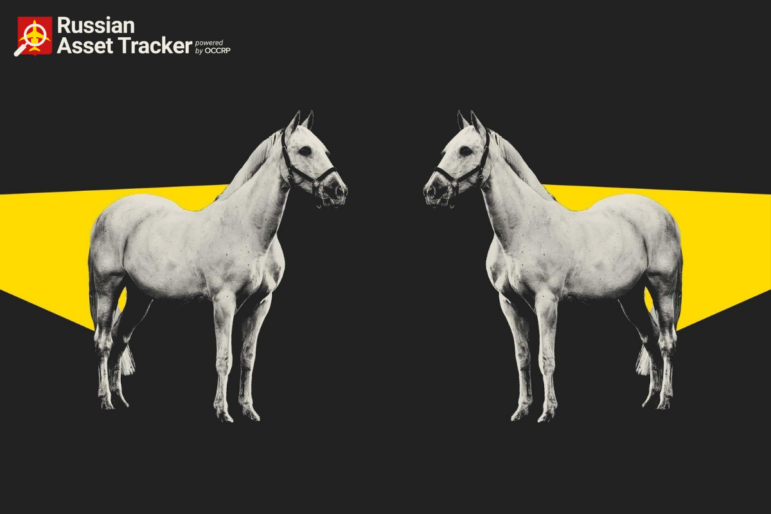

Image: Shutterstock
Chasing Oligarchs Across Borders
Read this article in
When Russian customs data for coal exports is sorted not by price, but by tonnage, an obscure company suddenly stands out. It is registered to a small building on the outskirts of the southern border city of Rostov-on-Don, next to a car repair shop and a construction store.
The paper trail shows that this enterprise shipped nearly half a million tons of coal abroad in two years, mainly to Turkey. The coal is declared “Russian,” but in reality, reporters say that the product comes from mines in Russian-occupied parts of Ukraine’s Donetsk and Luhansk regions. An investigation by the independent outlet iStories reported that this firm, Energoresurs, is closely linked to Oleksandr Yanukovych, the son of ousted Ukrainian president Viktor Yanukovych, and that the profits are routed through an offshore company while the war continues.
At the 14th Global Investigative Journalism Conference (GIJC25) in Malaysia, the author of that investigation, iStories’ Maria Zholobova, joined Jelena Cosic from the International Consortium of Investigative Journalists (ICIJ), Armando.Info’s Joseph Poliszuk, and Indonesian visual investigations producer and OSINT researcher Aqwam Fiazmi Hanifan, who works for Narasi.
Together they explained how they build dossiers on oligarchs, mine corporate and sanctions databases, construct their own datasets, and combine leaks, customs records, and local registries — all while navigating the legal and security risks that come with investigating powerful figures that may not want you digging into their corporate exploits.
Build Your Own Database
For Jelena Cosic, every oligarch investigation begins in the same place: with a person and a spreadsheet.
“We always should start, no matter who we research, with these things,” she told the panel. Reporters should record basic identifiers — date of birth, addresses, passport numbers — all spelling variants of names, relatives and in-laws, business partners, offshore companies, and intermediaries. “Each line in the spreadsheet is a verified piece of information that can later be searched, filtered, and cross-referenced.
“Each row you would fill with another [piece of] information,” she said. “It will help you once you are stuck somewhere and you’re not sure where to go next.”
The second step is to feed that spreadsheet with documents. At ICIJ, Cosic’s team uses Datashare, an open source tool that can be installed locally. Reporters can scan and upload printed documents to make them searchable, while large PDF dumps can become an internal archive where names, addresses, and companies can be found across thousands of pages in seconds.
Court records are another priority — “the gold mine for many of these guys,” Cosic noted.
From Offshore Leaks to OpenSanctions
Once the basic profile is built, Cosic connects people to corporate and sanctions data.
ICIJ has published searchable databases from its major projects — including Offshore Leaks and Pandora Papers — that contain profiles of “power players” and “confidential clients” and link to original corporate records and legal filings. Many of these documents are also available on DocumentCloud, a widely used repository used by investigative centers.
Among open data tools, Cosic highlighted:
- OpenCorporates, a key global company database that often gives the first overview of an oligarch’s corporate footprint.
- Property and land registers, especially in jurisdictions favored by elites. Spain’s Property Cadastre, for example, allows name-based searches for a fee and helps map villas on the coast owned via offshore entities.
- OCCRP’s Investigative Dashboard, which lists corporate, land, and court registries for many countries, and which is a good starting point when you do not know which authority holds a particular dataset.
She also recommended OpenSanctions, which aggregates sanctions lists from multiple jurisdictions and, crucially, all major spelling variants of sanctioned individuals’ names.
For politically exposed persons, Cosic mentioned specialized PEP databases she uses to double-check whether she has missed any companies tied to a target. And while commercial databases such as Sayari or Orbis can be costly, she urged newsrooms to negotiate temporary or discounted access, sometimes in exchange for credit in published stories.
Russia and Ukraine: Tracing Valuable Coal Through Trade Databases
Maria Zholobova’s investigation shows how customs data and leaked databases can be combined to map opaque trade schemes.
Instead of looking at prices, which can be manipulated, she sorted several years of Russian coal exports by shipment weight. Among them, she noticed an unfamiliar company that, since 2023, had converted into a much bigger player: a firm registered at a modest address in the southern Russian city of Rostov-on-Don.
Corporate records showed that the company had taken loans from firms registered in the occupied Ukrainian territories and from entities linked to the former president, Viktor Yanukovych, and to his son’s business network. To identify the real owners and managers, Zholobova turned to an ecosystem of leaks and unofficial data markets that have emerged as official registers in Russia have closed: databases from banks, mobile operators, and taxi services, often accessed through Telegram bots.
By checking employment histories and how phone numbers were saved in other people’s contact lists, she found that the nominal owners and directors were, in fact, employees of companies associated with Yanukovych’s structures.
Foreign journalists may need to cooperate with Russian-speaking reporters when investigating similar networks, because this work depends on Russian-language materials and informal channels.
Venezuela: Revealing the Country’s New Oligarchs
Joseph Poliszuk spoke about the experience of the Venezuelan investigative outlet Armando.info in tracking the oligarchs that circled around former president Hugo Chávez, and are now linked to his successor, Nicolás Maduro.
Poliszuk’s investigations in Venezuela focus on the “boliburgueses” – business people who have become wealthy through their proximity to the Bolivarian government.
One of them was the government’s leading food supplier — but investigations into the quality of the food his organization was paid to deliver to the hungry, and especially the powdered milk delivered to poor households, found it to be nutritionally inadequate. Reporters combined trade data, corporate documents, and laboratory tests to show this.
“We tested eight brands of the milk of the government,” Poliszuk recalled. “In one of the cases… one normal glass of milk was the same as 41 glasses of that kind of milk that they were giving to the people.”
The investigation led to a defamation case and pressure on the newsroom; after an insider warned that authorities planned to visit reporters’ homes, some team members left the country, and many of them now operate from exile.
In other projects, Armando.info reporters relied on property and corporate records. In one, they showed how the family of Venezuela’s first lady had bought out an entire street — 14 houses — using a proxy owner who was a former classmate. Proving ownership required cadastre documents, social media, off-the-record sources, and cross-checks with a separate court case in Miami.
When official data was missing, the newsroom searched elsewhere to build their own databases. Reporters compiled a national contracts registry from scattered documents and matched it against lists of generals and senior officials, exposing an oligarch who secured the state’s best contracts. They also matched the names of Chavez and Maduro officials with company records in Miami, finding that many had businesses — and often homes — in the United States.
Indonesia: Football Clubs as Laundromats
Indonesian journalist Aqwam Fiazmi Hanifan showed how local registries and OSINT tools can reveal oligarch networks in Indonesia. Many corporate records are only available by purchasing documents from the Ministry of Law.
The AHU database lets you search profiles of Indonesian limited liability companies and view both a “latest profile” (current status, address, directors, and a snapshot of shareholders) and a “full profile” with the company’s complete legal history, including all changes to deeds, shares, and management. It also helps you trace ownership structures by showing direct shareholders, multi-layered corporate chains, nominee owners, and offshore vehicles, including those registered in jurisdictions like Hong Kong and Singapore.
“Oligarchs don’t just put the money into mining or private banks,” Hanifan said. “Sometimes they also put [it] into different businesses like coffee shops, restaurants, and football clubs. By hiding the real owners behind multiple layers of companies and using football clubs as a public face, wealthy people in Indonesia can quietly move and launder money, mask conflicts of interest, and shield other shady businesses from scrutiny.”
In one project that used the AHU database, Hanifan mapped a complex ownership structure behind a professional football club, showing links back to extractive industries.
For phone-based research, Hanifan uses Getcontact, which shows how a number is saved in other users’ address books, and OSINT Industries, which maps social media accounts linked to a given phone or email. But he warned that using data from breaches or leaks can be risky under Indonesia’s IT law. “You can be arrested,” he said.
Practical Takeaways for Investigating Oligarchs
The panelists agreed on several core lessons:
- Systematically collect and organize data on people and entities in your own spreadsheet before diving into external tools.
- Use both global and local registries: sanctions and offshore databases, national corporate and land registers, customs data, court records, and sector-specific datasets such as election rolls or alumni lists.
- Build your own database when the state does not publish what you need – for example, by assembling contract records or lists of officials and matching them to foreign company registers.
- Treat leaks and gray market data with caution, weighing legal risks and security implications for sources and colleagues.
- Collaborate with colleagues from other countries to get help with “gray” sources.
Inna Gadzynska is a Ukrainian journalist with nearly 20 years of experience in print and online media. She worked as a media trainer for almost 8 years, conducting trainings on storytelling and editorial workflow. Since 2019 she has been working as an editor at the Ukrainian data journalism newsroom Texty.org.ua. Gadzynska was among the nominees of the European Press Prize for innovations in 2024, and among the winners of the Ukrainian national competition Honor of the Profession in 2023. Gadzynska also worked as an associate regional editor at GIJN in 2019.











